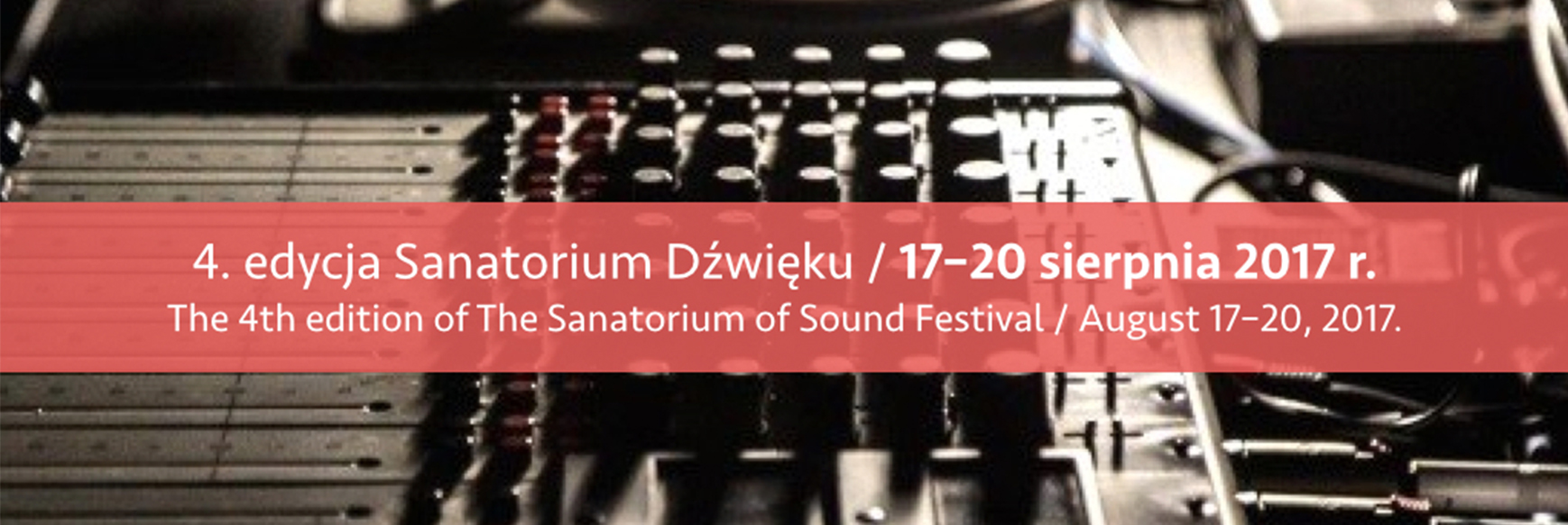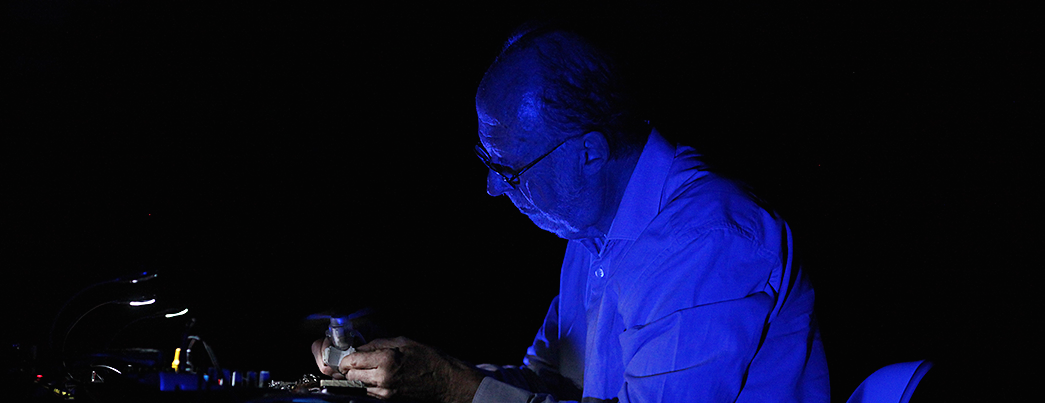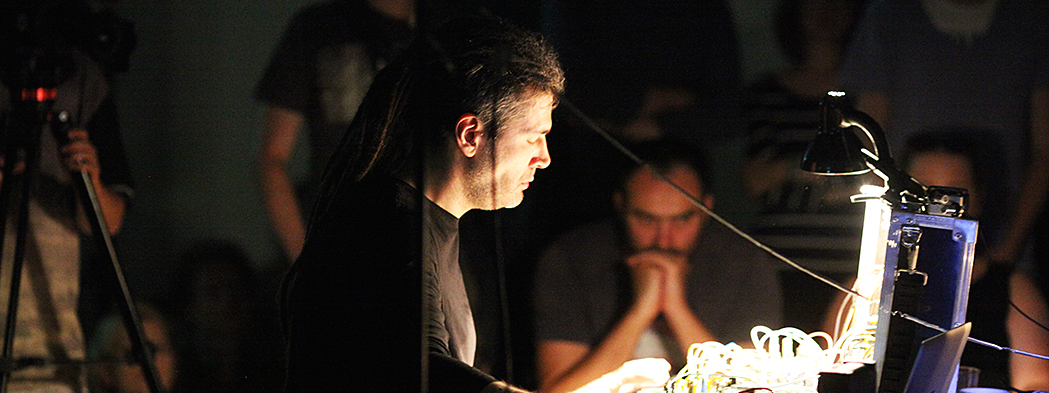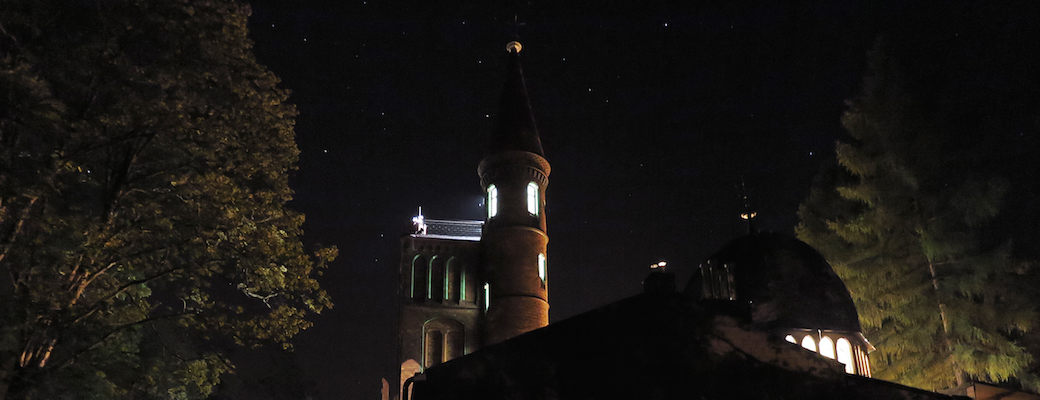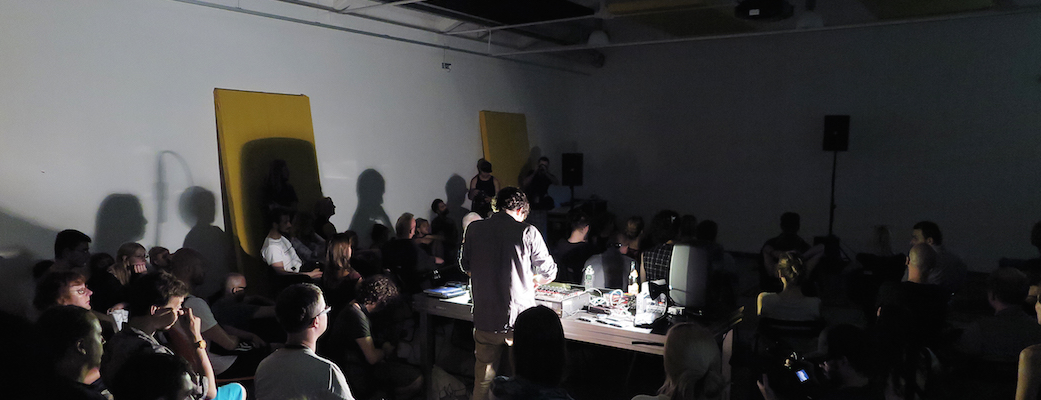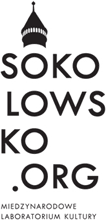





14 August / SUNDAY / 13.00–14.00 / Park
“The State of post-AMM Improvisation” – a lecture by Brian Olewnick
Panel discussion with Brian Olewnick, Keith Rowe and Daniel Brożek
Location: Park
Brian Olewnick bio.
Born, 1954. Studied art and art history at Vassar College and the School of the
Museum of Fine Art in Boston. Helped run the jazz/new music loft, Environ, in New
York City, 1976-1980. Seduced by the Internet to write about music in the mid-90s.
Has written for All Music Guide, The Wire, Time-Out NY, Bagatellen and other places
including his own blog, Just Outside. Has been working for entirely too long on a
biography of Keith Rowe, hoping to have it published in 2017. Lives quietly in
Kinderhook, NY.
In his spare time, Olewnick writes about music (and other stuff) here and for Squid’s Ear. He’s engaged in an increasingly lengthy project writing the biography of Keith Rowe, improvising musician and founding member of AMM. Among other things, Olewnick paints and is a pretty damn fair crossword solver. “You think it’s one way. But it’s the other way.” – Marlo Stansfield
Keith Rowe
(born 16 March 1940 in Plymouth, England) is an English free improvisation tabletop guitarist and painter. Rowe is a founding member of both the influential AMM in the mid-1960s (though in 2004 he quit that group for the second time) and M.I.M.E.O. Having trained as a visual artist, Rowe’s paintings have been featured on most of his own albums. After years of obscurity, Rowe has achieved a level of relative notoriety, and since the late 1990s has kept up a busy recording and touring schedule. He is seen as a godfather of EAI (electroacoustic improvisation), with many of his recent recordings having been released by Erstwhile Records. Rowe began his career playing jazz in the early 1960s—notably with Mike Westbrook and Lou Gare. His early influences were guitarists like Wes Montgomery, Charlie Christian and Barney Kessel.[1] Eventually, however, Rowe grew tired of what he considered the form’s limitations. Rowe began experimenting, slowly and gradually. An important step was a New Year’s resolution to stop tuning his guitar—much to Westbrook’s displeasure. Rowe gradually expanded into free jazz and free improvisation, eventually abandoning conventional guitar technique.
This change in his approach to guitar, Rowe reports, was partly inspired by a teacher in one of his painting courses who told him, “Rowe, you cannot paint a Caravaggio. Only Caravaggio can paint Caravaggio.” Rowe reports that after considering this idea from a musical perspective, “trying to play guitar like Jim Hall seemed quite wrong.” For several years Rowe contemplated how to reinvent his approach to the guitar, again finding inspiration in visual art, namely, American painter Jackson Pollock, who abandoned traditional painting methods to forge his own style. “How could I abandon the technique? Lay the guitar flat!”
Rowe developed various prepared guitar techniques: placing the guitar flat on a table and manipulating the strings, body and pick-ups in unorthodox ways to produce sounds described as dark, brooding, compelling, expansive and alien. He has been known to employ objects such as a library card, rubber eraser, springs, hand-held electric fans, alligator clips, and common office supplies in playing the guitar. A January 1997 feature in Guitar Player magazine described a Rowe performance as “resemble a surgeon operating on a patient.” Rowe sometimes incorporates live radio broadcasts into his performances, including shortwave radio and number stations (the guitar’s pick-ups will also pick up radio signals, and broadcast them through the amplifier).
AMM percussionist Eddie Prévost reports that Rowe has “an uncanny touch on the wireless switch”, able to find radio broadcasts which seem to blend ideally with, or offer startling commentary on, the music. (Prévost, 18). On AMMMusic, towards the end of the cacophonous “Ailantus Glandolusa”, a speaker announces via radio that “We cannot preserve the normal music.” Prevost writes that during an AMM performance in Istanbul, Rowe located and integrated a radio broadcast of “the pious intonation of a male Turkish voice. AMM of course, had absolutely no idea what the material was. Later, it was complimented upon the judicious way that verses from The Koran had been introduced into the performance, and the respectful way they had been treated!” In reviewing World Turned Upside Down, critic Dan Hill writes, “Rowe has tuned his shortwave radio to some dramatically exotic gameshow and human voices spatter the mix, though at such low volume, they’re unintelligible and abstracted. Rowe never overplays this device, a clear temptation with such a seductive technology – the awesome possibility of sonically reaching out across a world of voices requires experienced hands to avoid simple but ultimately short-term pleasure. This he does masterfully, mixing in random operatics and chance encounters with talkshow hosts to anchor the sound in humanity, amidst the abstraction.”
Some accounts report that Rowe’s guitar technique was an influence on Pink Floyd founder Syd Barrett: “Taking his cues from experimental guitarist Keith Rowe of AMM, Barrett strived to push his music farther and farther out into the zone of complete abstraction.”[6]
Rowe has worked together with numerous composers and musicians, including Cornelius Cardew, Christian Wolff, Howard Skempton, Jeffrey Morgan, John Tilbury, Evan Parker, Taku Sugimoto, Otomo Yoshihide, Sachiko M, Oren Ambarchi, Christian Fennesz, Burkhard Beins, Toshimaru Nakamura, David Sylvian and Peter Rehberg.
http://efi.group.shef.ac.uk/musician/mrowe.html
Daniel Brozek / Czarny Latawiec – Wroclaw based sound art curator and and modern music critic. Curator of Sound Art Forum of Survival Art Review ( http://www.survival.art.pl/,92), Canti Illuminati Festival (http://cantiilluminati.blogspot.com/p/canti-illuminati-festival.html) and G23 gallery. His texts were published by magazines: Glissando, Notes na 6 tygodni, Ruch Muzyczny, Rita Baum, ArtPapier and Canti Illuminati blog. He ran radio broadcast series about experimental music in Radio Sitka. Lecturer and panelist during Musica Electronica Nova festival and Wroclaw Sound Studies Seminars. As producer and sound artist under Czarny Latawiec project (http://cantiilluminati.blogspot.com/p/mixtapes.html) is working in the fields of sonoristic plunderphonics and sound imperialism, his productions are devoted to the epiphanies of african rhythms’ timelessness and the power of just intonation frequencies. Released 4 albums for labels Mik.Musik. and BDTA. His sound installations were presented during festivals T-Mobile Nowe Horyzonty and OUT OF STH. Produced a soundtrack for theatre play “Music from Auschwitz” by Agnieszki Kłos (Teatr Polski). Played at festiwals: Tauron Nowa Muzyka, Unsound Kraków, Ars Cameralis, PHONO, Simcha.
.
https://soundcloud.com/czarny-latawiec/ 
foto (c) Taras Khimchak
